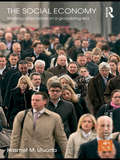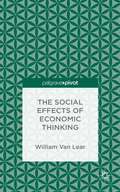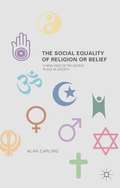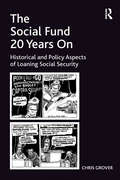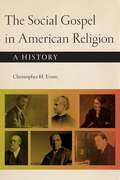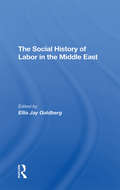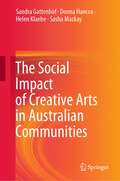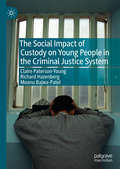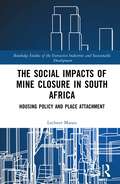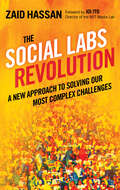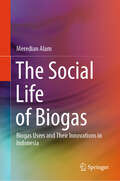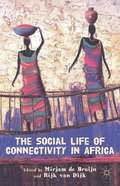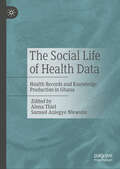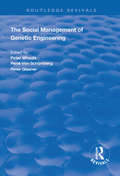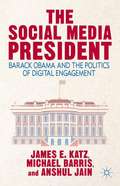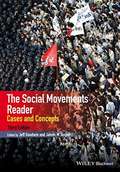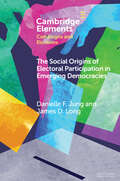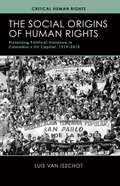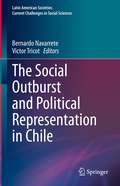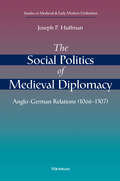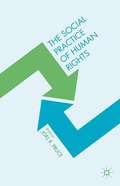- Table View
- List View
The Social Economy: Working Alternatives in a Globalizing Era (Rethinking Globalizations #Vol. 17)
by Hasmet M. UluortaCritically examining economic developments within the last sixty years, this book argues that a crisis in global social reproduction is altering existing understandings of work, labour and the economy. The author of this original volume, Hasmet M. Uluorta, contends that the crisis in the global economy is triggering a potential paradigm shift from one defined under the rubric of Employment to an alternative theorized as Work. Discussing the Employment paradigm that formed the dominant mode of development after the Second World War through to the 1970s, the author considers the economic and political forces that resulted in its eventual decline. Focusing on already existing practices of organizations and workers in Toronto, Canada, the book goes on to consider the shift to Work and the consequent rise in the social economy which has broken down conventional categories of work and leisure. The author concludes that the social economy presents fundamental challenges to understandings that underpinned the previous economic order. Building on insights from a range of disciplines, The Social Economy will be of interest to students and scholars of international political economy, international relations, labour studies, sociology, and globalization studies.
The Social Effects of Economic Thinking
by William Van LearThe book explains how social outcomes result from the influence of economic ideas which are themselves strongly impacted by the distribution of power in society. The book examines policies and programs of contending interests, emphasizing the importance of socio-economic issues stemming from quasi-economic stagnation.
The Social Equality of Religion or Belief: A New View of Religion's Place in Society
by Alan CarlingThe Social Equality of Religion or Belief.
The Social Fabric of Cities (Design and the Built Environment)
by Vinicius M NettoBringing together ideas from the fields of sociology, economics, human geography, ethics, political and communications theory, this book deals with some key subjects in urban design: the multidimensional effects of the spatial form of cities, ways of appropriating urban space, and the different material factors involved in the emergence of social life. It puts forward an innovative conceptual framework to reconsider some fundamental features of city-making as a social process: the place of cities in encounters and communications, in the randomness of events and in the repetition of activities that characterise societies. In doing so, it provides fresh analytical tools and theoretical insights to help advance our understanding of the networks of causalities, contingencies and contexts involved in practices of city-making. In a systematic attempt to bring urban analysis and research from the social sciences together, the book is organised around three vital yet relatively neglected dimensions in the social and material shaping of cities: (i) Cities as systems of encounter: an approach to urban segregation as segregated networks; (ii) Cities as systems of communication: a view of shared spaces as a means to association and social experience; (iii) Cities as systems of material interaction: explorations on urban form as an effect of interactivity, and interactivity as an effect of form. Visit the author’s website at: http://socialfabric.city/
The Social Foundations of World Trade
by Sungjoon ChoAs highlighted by Pascal Lamy, the former head of the WTO, world trade traditionally involves state-to-state contracts and is based on an anachronistic 'monolocation' production/trade model. It therefore struggles to handle new patterns of trade such as global value chains, which are based on a 'multilocation' model. Although it continues to provide world trade on a general level with a powerful heuristic, the traditional 'rationalist' approach inevitably leaves certain descriptive and normative blind spots. Descriptively, it fails to explain important ideational factors, such as culture and norms, which can effectively guide the behaviour of trading nations with or without material factors such as interests and utilities. Normatively, the innate positivism of the traditional model makes it oblivious to the moral imperatives of the current world trading system, such as development. This book emphatically redresses these blind spots by reconstructing the WTO as a world trade community from a social perspective.
The Social Fund 20 Years On: Historical and Policy Aspects of Loaning Social Security
by Chris GroverIn 2008 the Social Fund had been in operation for 20 years. This has provided a timely opportunity to not only critically reflect upon its introduction in 1988 and its operation in the past two decades, but also to place it within its historical context. There is a particular need to engage with the argument that was made in the 1980s that relieving need by way of loan was new in social security policy. In this groundbreaking study, Chris Grover provides the reader with evidence that this is not the case by locating Social Fund loans in a lengthy history of debate about, and practice in, loaning poor relief and social security. Using primary data hitherto unused in social policy research, Grover shows that there is a long history embedded in British systems of poor relief of authorities having the power to loan applicants either cash that had to be repaid or providing food and items, the value of which then had to be repaid. Understanding this history will give a greater depth to our understanding of the state's purposes in relieving the financial needs of the poorest people as well as to our knowledge of contemporary social security policy.
The Social Gospel in American Religion: A History
by Christopher H EvansA new and much-needed history of one of America&’s most important religious movements . . . from before the Civil War to after Civil Rights to Barack Obama.&” —Barry Hankins, Professor of History, Baylor University The global crises of child labor, alcoholism and poverty were all brought to our attention through the social gospel movement. Its impact on American society makes it one of the most influential developments in American religious history. Christopher H. Evans traces the development of the social gospel in American Protestantism, and illustrates how the religious idealism of the movement also rose up within Judaism and Catholicism. Contrary to the works of previous historians, Evans demonstrates how the presence of the social gospel continued in American culture long after its alleged demise following World War I. Evans reveals the many aspects of the social gospel and their influence on a range of social movements during the twentieth century, culminating with the civil rights movement in the 1950s and 1960s. It also explores the relationship between the liberal social gospel of the early twentieth century and later iterations of social reform in late twentieth century evangelicalism.The Social Gospel in American Religion considers an impressive array of historical figures including Washington Gladden, Emil Hirsch, Frances Willard, Reverdy Ransom, Walter Rauschenbusch, Stephen Wise, John Ryan, Harry Emerson Fosdick, A. J. Muste, Georgia Harkness, and Benjamin Mays. It demonstrates how these figures contributed to the shape of the social gospel in America, while arguing that the movement&’s legacy lies in its profound influence on broader traditions of liberal-progressive political reform in American history.
The Social History Of Labor In The Middle East
by Ellis GoldbergOnce considered of little import, the social history of labor in the Middle East emerged in the 1980s as a major area of research, as historians sought to uncover the roots of working-class organizing. This volume, the first in an important new series, presents a broad overview of recent literature on the history of workers in the Middle East since 1800 in a bold effort to bring together new directions in research and to reexamine the relevance of established ones. Contributors explore the history of labor by situating state-led industrialization within the context of older artisanal social communities. They examine how industrialization enhanced government control over the economy as a whole and analyze the public's reaction to centralized economic authority. They also explain the longevity of social coalitions supporting state industrial monopolies and examine their breakdown, along with the emergence of Islamist and other oppositional movements. Taken together the essays provide a historically grounded context for viewing the shifting relationship between states and the world economy as well as between particular states and classes and form a rich synthesis of current interdisciplinary literature on work and workers in the region.
The Social Impact of Creative Arts in Australian Communities
by Sandra Gattenhof Donna Hancox Helen Klaebe Sasha MackayThis book brings together discussions about Australian arts policy and funding, outcomes of arts engagement in terms of social inclusion, well-being and education. It presents exemplars of creative programs or case studies that build capacity and lasting impact for communities in urban and regional Australia. This book describes the impact of the arts using narrative case studies. Through this, it develops conceptual understanding and frameworks that can be used to dynamically assess the value and impact of arts engagement across the three types of cultural value: intrinsic value, instrumental value and institutional value. It focuses on how arts engagement creates, supports and extends factors such as well-being, social inclusion and educational achievement. This book provides an innovative examination of the evidence from Australian projects depicting the impact of the arts on a range of indicators and sectors.
The Social Impact of Custody on Young People in the Criminal Justice System
by Claire Paterson-Young Richard Hazenberg Meanu Bajwa-PatelThis book explores the journey of young people through a Secure Training Centre and, more generally, the criminal justice system in the UK. It examines the extent to which young people have been failed by the system at every stage of their lives, with incarceration used as a means of removing ‘the problem’ from society. To explore this process, the authors utilise an integrated theoretical framework to develop a new rehabilitative approach focused on developing positive outcomes for young people. The book deploys a social impact measurement methodology to evaluate the experience and outcomes of youth justice interventions at a Secure Training Centre. Such an approach provides a fresh perspective on the youth justice debate which has traditionally utilised outcome data to measure immediate impact relating to recidivism and is therefore not focused on the young person holistically. Using a social impact framework to evaluate youth justice, underpinned by an integrated theoretical framework, allows for assessment to be made which place the young person at the centre of evaluation.
The Social Impacts of Mine Closure in South Africa: Housing Policy and Place Attachment (Routledge Studies of the Extractive Industries and Sustainable Development)
by Lochner MaraisThis book investigates the relationship between mining, mine closure and housing policy in post-apartheid South Africa, using concepts from new institutional economics and evolutionary governance theory. Mine closures present a major challenge to the mining industry and governments, with this being particularly noticeable in the Global South. This book argues that the dependencies created by the mining industry and mine housing policies while a mine is operational cause serious societal problems when it closes. To demonstrate this, the book applies the concepts of place attachment, asset-based development and social disruption. Conceptually, the book challenges the view that place attachment and asset-based development are the most appropriate and often the only policy responses in mining areas. In South Africa, the mining industry and the government have created comprehensive housing programmes linked to homeownership to promote place attachment, stability and wealth among mine workers. These programmes do not consider the disruption that mine closure might bring. The book challenges the blind application, during boom periods, of policies which create long-term dependencies that are difficult to manage when a mine closes. This book will be of interest to students and scholars researching the social impacts of mining and the extractive industries, social geography and sustainable development, as well as policymakers and practitioners working with mine closure or social impact assessments.
The Social Labs Revolution: A New Approach to Solving our Most Complex Challenges
by Zaid HassanCurrent responses to our most pressing societal challenges—from poverty to ethnic conflict to climate change—are not working. These problems are incredibly dynamic and complex, involving an ever-shifting array of factors, actors, and circumstances. They demand a highly fluid and adaptive approach, yet we address them by devising fixed, long-term plans. Social labs, says Zaid Hassan, are a dramatically more effective response. Social labs bring together a diverse a group of stakeholders—not to create yet another five-year plan but to develop a portfolio of prototype solutions, test those solutions in the real world, use the data to further refine them, and test them again. Hassan builds on a decade of experience—as well as drawing from cutting-edge research in complexity science, networking theory, and sociology—to explain the core principles and daily functioning of social labs, using examples of pioneering labs from around the world. He offers a new generation of problem solvers an effective, practical, and exciting new vision and guide.
The Social Life of Biogas: Biogas Users and Their Innovations in Indonesia
by Meredian AlamThis is the most comprehensive book discussing the impact of renewable energy transition by engaging local narratives, and combining this with the domestication of technology theory. Addressing a specific concern, the discussion considers the development of household biogas from an interdisciplinary sociological perspective and addresses the success factors for the implementation of biogas policy on the household level in Indonesia. Drawing upon extensive ethnographic fieldwork in a rural Indonesia, this book explores the interactive process of social and technological innovation from a user perspective. Their social interactions with wider stakeholders such as biogas technology trainers, laborers, construction partner organizations, and fellow users are examined. The author sheds light on emerging evidence around biogas sustainability by engaging a unique interdisciplinary framework that combines aspects of both sociology and engineering. Offering a unique insight, this book is relevant for social scientists, postgraduate students, social workers, environmental activists, communication experts, and engineers working across aspects of renewable energy development. They will gain new interdisciplinary insights and applicable approaches to building household biogas by actively engaging the users.
The Social Life of Connectivity in Africa
by Mirjam De Bruijn Rijk Van DijkThe rapid increase in adoption of modern 'connective' technologies like the mobile phone has reshaped the social landscape of Africa. This book examines the myriad possibilities that the post-global moment offers African societies to develop and to relate, offering profound new insights into the processes of globalization.
The Social Life of Hagiography in the Merovingian Kingdom
by Jamie KreinerThis book charts the influence of Christian ideas about social responsibility on the legal, fiscal and operational policies of the Merovingian government, which consistently depended upon the collaboration of kings and elites to succeed, and it shows how a set of stories transformed the political playing field in early medieval Gaul. Contemporary thinkers encouraged this development by writing political arguments in the form of hagiography, more to redefine the rules and resources of elite culture than to promote saints' cults. Jamie Kreiner explores how hagiographers were able to do this effectively, by layering their arguments with different rhetorical and cognitive strategies while keeping the surface narratives entertaining. The result was a subtle and captivating literature that gives us new ways of thinking about how ideas and institutions can change, and how the vibrancy of Merovingian culture inspired subsequent Carolingian developments.
The Social Life of Health Data: Health Records and Knowledge Production in Ghana
by Alena Thiel Samuel Aniegye NtewusuThis book takes the contemporary moment of digital health infrastructuring in Ghana as a starting point to examine the genealogies of oral, paper-based and digital forms of knowledge production about health. In view of this multiplicity of forms, the chapters adopt a broad definition of health data that encompasses databases, statistics as well as oral and written records and reports about health. In addition to close historiographic insights into the interactions of indigenous and colonial ways of organising knowledge around health, the chapters explore contemporary ways in which medical professionals are mobilized or potentially demobilized by the standards, methods and calculative devices that accompany the increasing production of health data. The authors show that the contemporary hype around the datafication of health is neither new nor exceptional, but instead needs to be read in broader historical perspective. Through its unique combination of historical, sociological and ethnographic methods, the book shows that the regulation and standardization of health produces both mobilizations and demobilizations, as well as appropriations and resistances.
The Social Management of Genetic Engineering (Routledge Revivals)
by Peter Wheale René von SchombergFirst published in 1998, this volume why and how genetic engineering has emerged as the technology most likely to change our lives, for better or worse, in the opening century of the third millennium. Over twenty international experts, including moral philosophers and social scientists, describe the issues and controversies surrounding modern biotechnology and genetic engineering. They explore ways in which lay individuals and groups can join in an effective and constructive dialogue with scientists and industrialists over the assessment, exploitation and safe management of these new and important technologies. Topics covered include a discussion of the issues surrounding ‘Dolly’, the cloned sheep, the politics and ethics of the international research programme to sequence the entire human genome, the ethical questions raised by the creation of transgenic farm animals, the morality of genetic experimentation on animals, the controversy surrounding the patenting of genetic material and of the transgenic animals themselves, the ethical implications of engineering animals for transplanting their organs into humans, and the environmental hazards of releasing genetically engineered organisms.
The Social Media President
by James E. Katz Michael Barris Anshul JainThe proliferation of social media has altered the way that people interact with each other - leveling the channels of communication to allow an individual to be "friends" with a sitting president. In a world where a citizen can message Barack Obama directly, this book addresses the new channels of communication in politics, and what they offer.
The Social Movements Reader: Cases and Concepts Third Edition
by Jeff Goodwin James M. JasperProviding a unique blend of cases, concepts, and essential readings The Social Movements Reader, Third Edition, delivers key classic and contemporary articles and book selections from around the world. Includes the latest research on contemporary movements in the US and abroad, including the Arab spring, Occupy, and the global justice movement. Provides original texts, many of them classics in the field, which have been edited for the non-technical reader. Combines the strengths of a reader and a textbook with selected readings and extensive editorial material.
The Social Origins of Electoral Participation in Emerging Democracies (Elements in Campaigns and Elections)
by James D. Long Danielle F. JungGiven the enormous challenges they face, why do so many citizens in developing countries routinely turn out to vote? This Element explores a new explanation grounded in the social origins of electoral participation in emerging democracies, where mobilization requires local collective action. This Element argues that, beyond incentives to express ethnic identity and vote-buying, perceptions of social sanctioning from community-based formal and informal actors galvanize many to vote who might otherwise stay home. Sanctioning is reinforced by the ability to monitor individual turnout given the open layout and centralized locations of polling stations and the use of electoral ink that identifies voters. This argument is tested using original survey and qualitative data from Africa and Afghanistan, contributing important insights on the nature of campaigns and elections in the promotion of state-building and service delivery, and the critical role voters play reducing fears of global democratic backsliding.
The Social Origins of Human Rights
by Luis Van IsschotHuman rights activism is often associated with international organizations that try to affect the behavior of abusive states around the globe. In Barrancabermeja, Colombia, argues Luis van Isschot in "The Social Origin of Human Rights," the struggle for rights has emerged more organically and locally, out of a long history of civil and social organizing. He offers deep insight into the lives of home-grown activists in a conflict zone, against the backdrop of major historical changes that shaped Latin America in the twentieth century. Built by Standard Oil in 1919, and home to the largest petroleum refinery in the country, Barrancabermeja has long been a critical battleground in Colombia s armed conflict. One of the most militarized urban areas on earth, the city has been a regional base for the Colombian armed forces as well as for leftist guerrillas and a national paramilitary movement. In the midst of a dirty war in which the majority of victims were civilians, urban and rural social movements from Barrancabermeja and the surrounding area came together to establish a human rights movement. These frontline activists called upon the Colombian state to protect basic human rights and denounced the deeper socioeconomic inequalities they saw as sources of conflict. Through close study of the complex dynamics at work in Barrancabermeja, van Isschot shows how the efforts we describe as human rights activism derive in large part from these lived experiences of authoritarianism, war, poverty, and social exclusion. Through its social and historical approach, his analysis both complements and challenges the work of scholars who look at rights issues primarily through a legal lens. "
The Social Outburst and Political Representation in Chile (Latin American Societies)
by Bernardo Navarrete Victor TricotThis is the first book in English to present a comprehensive analysis of the October 2019 social outbreak in Chile and its consequences for the country’s political system. For almost 30 years (1990-2019), Chile was recognized as a model of political and economic stability in Latin America, but the 2019 protests put into question the whole structure of representation based on programmatic political parties. This contributed volume analyzes the causes of the social outbreak by examining the interaction between political parties and social movements in Chile since 2000, establishing bridges between the sociology of social movements and the political science of parties and forms of traditional political representation. The book is organized in three parts. The first part analyzes the collapse of the political party system in Chile. The second part shows how social movements introduced innovative forms of political mobilization that challenged the traditional forms of political representation. Finally, the third part presents case studies focusing on specific social movements and their contributions to the renewal of political representation in Chile. The Social Outburst and Political Representation in Chile will be a valuable resource for sociologists, political scientists and other social scientists interested in understanding the challenges posed to political parties and institutions by social movements formed by citizens who no longer see themselves represented by the traditional forms political participation.
The Social Politics of Medieval Diplomacy: Anglo-German Relations (1066-1307)
by Joseph P. HuffmanLate nineteenth- and twentieth-century political and intellectual boundaries have heavily influenced our views of medieval Germany. Historians have looked back to the Middle Ages for the origins of modern European political crises. They concluded that while England and France built nation-states during the medieval era, Germany--lacking a unified nation-state--remained uniquely backward and undeveloped. Employing a comparative social history, Huffman reassesses traditional national historiographies of medieval diplomacy and political life. Germany is integrated into Anglo-French notions of western Europe and shown to be both an integral player in western European political history as well as a political community that was as fully developed as those of medieval England or France. The Social Politics of Medieval Diplomacyoffers a study of the social dynamics of relations between political communities. In particular, the Anglo-French political communities do not appear as state and constitution builders, while the German political community is not as a state and constitution destroyer. The book concludes by encouraging medievalists to integrate the German kingdom into their intellectual constructs of medieval Europe. This book is an essential history of medieval Germany. It bridges the gaps between Anglo-French and German scholarship and political and social history. Joseph Huffman makes available German-language scholarship. Both English and German history is integrated in an accessible and interesting way. The historiographical implications of this study will be far-reaching. Joseph P. Huffman is Associate Professor of History and Political Science, Messiah College.
The Social Practice of Human Rights
by Joel R. PruceThe Social Practice of Human Rights bridges the conventional scholar-practitioner divide by focusing on the space in between. In capturing this cutting edge research program, the volume proposes a perspective that motivates critical self-reflection of the strategies that drive communities dedicated to the advocacy and implementation of human rights. The social practice of human rights takes place not in front of a judge, but in the streets and alleys, in the backrooms and out-of-the-way places where change occurs. Contributors to this volume investigate the contexts and efforts of activists and professionals devoted to promoting human rights norms. This research takes as its subject the organizations and movements that shoulder the burden of improving respect for human dignity—and through a constructive critique of these patterns and practices, scholarship can have a positive impact on the political world.
The Social Process of Globalization
by Douglas W. BlumIt is often argued that globalization fosters 'hybridity', as some cultural imports are accepted, while others are 'localized', and others still are rejected outright. Yet we know relatively little about the social processes and mechanisms involved in cultural globalization. This book offers an empirically rich and theoretically compelling analysis of how cultural globalization occurs, including the structural conditions, personal meanings and social interactions associated with various outcomes. Providing a detailed analysis of the experiences of young people from Kazakhstan who lived in the United States temporarily, the author asks, how do return migrants react to cultural differences in America, and what changes do they try to incorporate into their lives back in Kazakhstan? What kinds of negotiations ensue, and what explains their success or failure? In answering these questions, Douglas W. Blum combines insights from sociology and anthropology along with specialized research on globalization, migration and post-Soviet studies.
